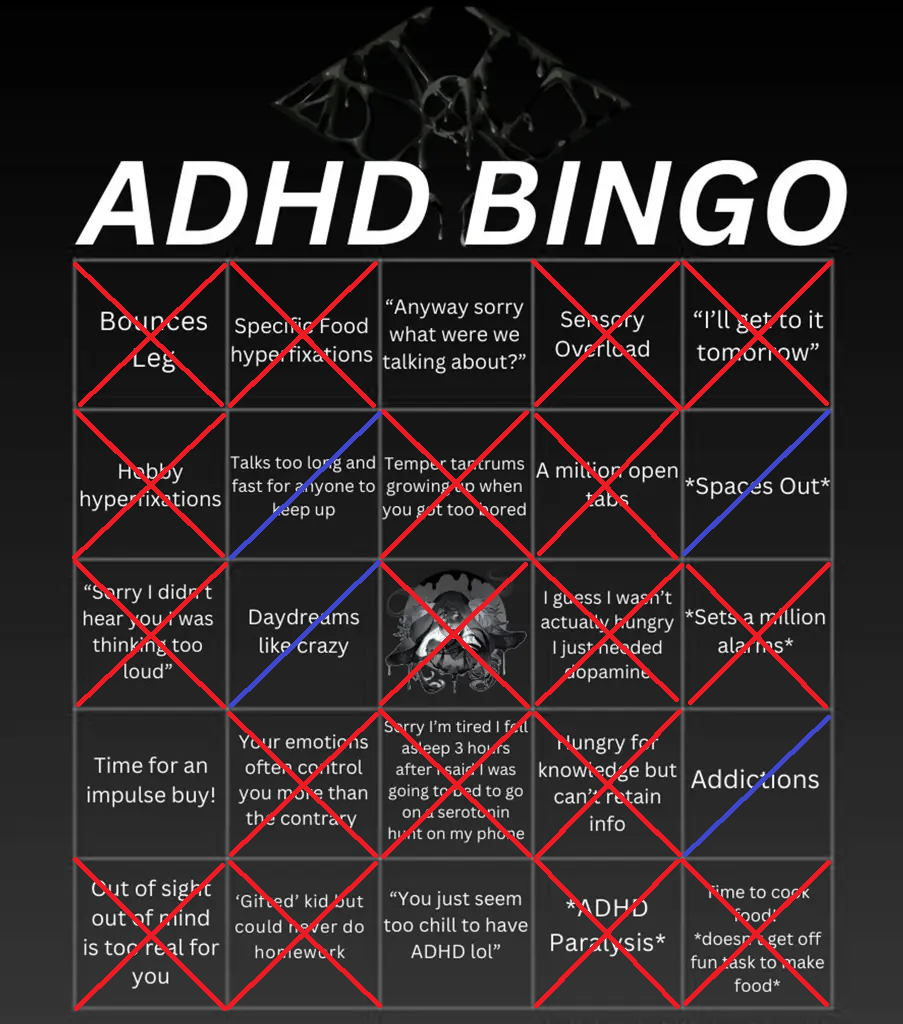
I know it’s ridiculous to use a bingo board meme as a diagnostic tool but should I be concerned if I got a whooooole lot of these?

Everybody sneezes if you sneeze 100 times in a day then it’s a problem

Depends on how often you experience these symptoms! If you experience them daily or nearly constantly, it would be worth investigating.

If you have some other mental-diversion like autism, bipolar or dyslexia then chances are high you have overlap with properties of other neurodivergent people.
Its also possible to be “functional and normal” but still have a neurodivergent brain. Disabilities are subjective in context of the (social) world around you.

All of these 😭😫
My doctor still thinks that adults can’t have ADHD.🙂

My doctor has ADHD! Pros: my ADHD diagnosis was super straightforward and he was overall helpful. Cons: forgets my appointments and talks too fast and overexplains or not at all. Still, I consider myself lucky

Depending on their training they essentially think adult ≠ adhd.
The easiest way to get a proper diagnosis is to imply that you were seriously tested for adhd/other neurodivergence as a child.
I’ve noticed that because of current understanding and research for adults are minimized due to people’s naturally tendency to develop coping mechanisms as they get older. So by saying you showed signs as a child they may take the time and actually listen to what you have to say. Definitely don’t lie but insist that you showed some signs as a child, and talk about issues you have today and steer them away from asking about details you had as a kid. I’d bet you did have some signs as a kid but you can’t remember/people didn’t notice. Remember a lot of these symptoms are related and could easily just be due to anxiety or well anxiety idk.
For me personally I was tested as a kid but had my medical record essentially wiped and my parents didn’t want me in any “special” classes. The schools I went to definitely had no handle on how to treat basically any neurodivergence other than stick everybody in the same class.
Another way is too force a recommendation from your doctor to a testing facility, psychiatrist, or therapist. And hopefully they’ll listen to you and get a good diagnosis. It probably won’t be covered by insurance and I’ve seen prices range from $500 to $2000 so make sure to ask. Some testing facilities technically brake the law by not informing you that’s it’s not covered under insurance, so make sure you get in writing that your exact insurance is covered. Not just x company accepts it but your exact insurance plan.

More like “Time to cook food! * Doesn’t cook food *”

I read this with my leg bouncing and it’s the first fucking square 😂😭
This entire thing is me to a tee since childhood.

fuck you (/j)


the ones in blue are ones I used to do but not anymore or ones that I am unsure about

What do I win? 💀

And there’s so much more that’s not even listed here.

Holy shit. Do I have ADHD?


Possible. Or autism. Or both.
There are a lot of helpful videos on youtube about it and a ton of actually helpful questionnaires online. If you fill out a couple you’ll get a goos first impression. A doctor should them assess further.

Where’s the one that I scrolled past this post and didn’t actually read a single tile

damn, 1 short of a blackout lol (talking too long and fast for anyone to keep up). just replace it with “constant, unrelenting music in my head, sometimes multiple songs at once” and I’m a winner

I have both, the fast talking switches out with not being able to form a coherent sentence from time to time and the music can be nice but also extremely distracting

What is sensory overload? Is it like that thing where you have to turn the volume down in the car when trying to park?

Personally for me being exposed to a lot of noises for a long time and not being able to escape from them causes the stress to build up and become very easly irritable, angry, and sensitive to everything. I’m curious how others experience it.

Yes and it sucks when you live below loud neighbors that are constantly making noise, stomping, and yelling at each other and you can’t escape because you’re in your own home.

I feel like the free space should be “pharmacy is out of Adderall”

bounces leg
I see a lot of people in my environment doing that. I don’t mean friends, just average people. How much of a sign is it when someone does that?

It can be a sign of a few things, like anxiety too, but it can also just be a sign that someone’s bored.
Like with most things, it doesn’t mean a lot on its own, but if it’s being done in excess, or uncontrollably, then it could be a sign of something else.

I uncontrollably play air drums or tap drum patterns with my hands and feet any time I’m idle. Like, idle for more than 5 seconds. If my hands are busy, I’m kicking double bass drum patterns with my feet. If I’m walking, its air drums or pseudo beatboxing quietly. It never ends.
Actually, that’s not true. It does stop sometimes; only when I’m in a severely distressing situation or horribly depressed. That’s how I know my shit’s fucked up; the drums stop. :(

BINGOh no

Is there a consern if a I got all of these as I don’t know if I have adhd or not.
Depends how often. If legit concerned, read up on ADHD symptoms and see how much they describe you and go from there.

I did and I now know that I probebly have adhd.
Knowing is half the battle. Now that you know, you can try the various coping mechanisms to deal with your ADHD. If those don’t work and your ADHD is severely impacting your life, you should consider seeing a professional to get some medication to alleviate some of the symptoms.

I have started cracking my knuckles and putting my hair behind my ear as coping mechanisms but before that I was chevinf my fingernails.
This is just stimming. I was talking about things like using a notebook, setting up more regular alerts etc. There’s various coping approaches one can do to alleviate some of the problems with ADHD

Sorry for my misunderstanding. As English is not my first language it’s sometimes hard for me to understand certain words but also alarms whould be a good idea and I will start to use them.

Alright, so first I want you to have a proper understanding of ADHD. The presentation that I’m about to send you is 9 years old so some of it’s information is outdated but it’s still a really great and comprehensive info about what ADHD actually is. The presentation is available in 3 parts and it’s 90 minutes long total: Part1 Part2 Part3.
When you watch this presentation I recommend watching this under 14 minute video about how to treat ADHD, it’s not perfect but it should give you directions: Link.
And now there’s my coping strategy that motivated me to do things in the past (I messed up and stopped using it and I don’t remember what I did wrong. But it wasn’t fault of the strategy though so I want to go back to it soon.). I used point/token based economy to motivate me. It works on the basis that you have to do a task to get points which then you can use up on nice things/activities.
1.) Find a task manager that works for you well. To mark how much tokens a task is worth you just put a number at the beginning or the end of it’s name, for example “(+2) Study 30 minutes for the exam”.
2.) To track your earned and spent tokens find a money tracking app and instead of using it for tracking your spendings and earnings of real money you will use it for tracking those tokens.
3.) Make a price list for common tasks and activities where you write down how much something costs you to do or how much points you will earn for doing them. It will take some experimenting to come up with a balance that will work the best for you.
4.) Make as much activites cost you tokens so you have more incentive to earn points. IMO it’s better to have many activities that cost you a little tokens than making an one general activity that costs you a lot of tokens.
5.) You can “buy” activities in different form, for example “buy listening music for the whole day for 5 points” or “Buy listening to music for 1 hour for 1 point”. It’s up to your creativity how you will organise those things.
6.) Don’t make prices/rewards for different tasks/advices cost the same, make more interesting activities more expensive and less interesting activities cheaper. Same goes for tasks, more important tasks will give you more points while less important tasks will give you less points.
7.) I almost forgot, you will also need some kind of schedule to plan your day so you know what to do instead of lazing around. Don’t make the schedule too strict, make spaces between task so if you delay one task it won’t affect the next tasks. Also make a time for breaks and stuff.
8.) Regardless of strategy you use to cope with ADHD, DO NOT GET TOO EXCITED! If you get excited and push yourself too much you will get burned out quickly and lose your motivation. Do everything with balance.
We’ll soon have a wiki with resources to help newbies to ADHD. @Martineski@lemmy.dbzer0.com might be able to link you to some stuff to check out until then

Setting a million alarms is not and ADHD symptom…
It’s a meme. Don’t overthink this. And if you do, check Rule 1.

Executive dysfuntion to get out of your bed is an ADHD symptom…

The pinned post explains this very well, but there aren’t really such things as adhd symptoms that are exclusive. People with adhd just tend to have these problems so often that they interfere with normal living and usually they have multiple of these problems

